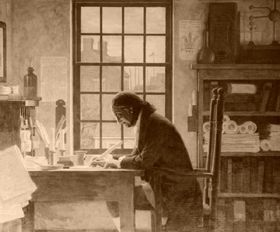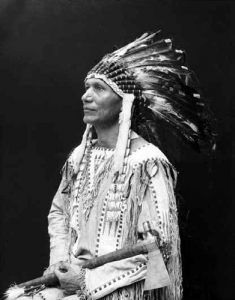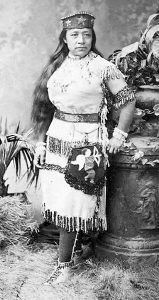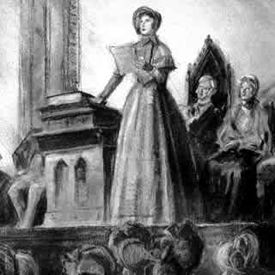American writings began with the implementation of the British colonies, thus linking the earliest writings to the tradition of English literature. Due to the significant immigration to Boston, Massachusetts, in the 1630s and the establishment of a college and a printing press in Cambridge, the New England colonies have often been regarded as the center of early American literature.
However, even earlier Spanish explorers and setters were documenting history in Saint Augustine, Florida, and Santa Fe, New Mexico, while Dutch immigrants were writing about their experiences in Albany, New York, and New Amsterdam, New York, and other English colonists in Jamestown, Virginia. And though it wasn’t in writing, Native Americans also passed along a wealth of oral literary traditions. Though this list of writers and historians documenting American History is far from complete, it’s a start to what will, over time, become a much more comprehensive list.
Writers and Historians:
Annie Heloise Abel (1873-1947) – Historian and professor renowned for her studies of Native Americans.
Hannah Adams (1755-1831) Historian and the first professional woman writer in the United States, publishing A Summary History of New England in 1799.
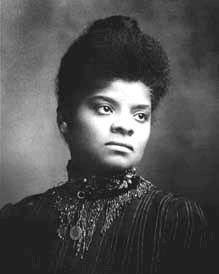
Ida B. Wells Barnett
Ida B. Wells Barnett (1862-1931) – A black journalist and militant civil rights leader, she co-founded the NAACP and was the first president of the Negro Fellowship League.
Mary McLeod Bethune (1875-1955) The daughter of former slaves, Mary became a writer, educator, champion of humanitarian causes, and advocated for Blacks’ civil rights and education.
Samuel Clemens (Mark Twain) (1835-1910) – The best-known author during the days of the Old West.
Dr. Benjamin Franklin (1706-1790) – A leading Founding Father of the United States, Franklin was also an author, printer, political theorist, politician, postmaster, scientist, musician, inventor, civic activist, statesman, and diplomat. He earned the title “The First American” for his tireless campaigning for colonial unity.
Dr. Charles Alexander Eastman, aka: Ohiyesa (1858-1939) – Santee Sioux author, physician, and reformer, Eastman was active in politics and helped found the Boy Scouts of America.
Margaret Fuller (1810-1850) Leading female intellectual and author of the pioneering feminist work Women in the Nineteenth Century in 1845. She edited for Ralph Waldo Emerson and became America’s first female correspondent while writing literary and social criticism in Europe for the New York Tribune.
Charles Carroll Goodwin (1832-1917) – Author, editor, poet, lawyer, judge, and businessman.
Francis Bret Harte (1836-1902) – Author and poet Harte is best remembered for his accounts of pioneering life in California.
Frederick Webb Hodge (1864-1956) – An author, editor, anthropologist, archaeologist, and historian, one of his most famous writings was the Handbook on American Indians, published in 1906.
Sarah Winnemucca Hopkins (1841?-1891) – The first Native American woman known to secure a copyright and publish in the English language. Her book, Life Among the Piutes: Their Wrongs and Claims, is an autobiographical account of her people during their first forty years of contact with explorers and settlers.
Emerson Hough (1857-1923) – The author of 34 books and countless magazine articles, Emerson Hough, wrote factual accounts and historical novels of life in the American West.
Colonel Henry Inman (1837-1899) – Well known as an officer in the United States Army and an author dealing with subjects of the Western plains.
Thomas Jefferson (1743-1826) – The third President of the United States and principal author of the Declaration of Independence, is known for promoting the ideals of republicanism in the United States. He is considered one of the most influential Founding Fathers.
William Bartholomew “Bat” Masterson (1856?-1921) – Ford County Kansas Deputy Sheriff and Sheriff, Trinidad, Colorado Marshal, Dodge City Peace Commissioner, U.S. Deputy Marshal In New York. Later a reporter for a New York newspaper wrote a series of articles for Human Life magazine in 1907 and 1908.
James Harvey McClintock (1864-1934) – Writer, journalist, and Rough Rider McClintock was also the Arizona State Historian and wrote several books on Arizona history.
Randall Parrish (1858-1923) – A minister, journalist, and later an author of history and fiction, Parrish was well known for his “dime novels.”
Charles Montgomery Skinner (1852-1907) – An American writer, he published collections of myths, legends, and folklore in the United States and worldwide.
Elizabeth Cady Stanton (1815-1902) Known, along with Susan B. Anthony, as one of the foremost figures of the movement for women’s equality.
Harriet Beecher Stowe (1811-1896) - Author and poet, she wrote the biggest bestseller of the nineteenth century, Uncle Tom’s Cabin. The novel, which first appeared in a serialized version in National Era magazine, was the first major American work in which a black man appeared as the central hero.
Robert M. Wright 1840-1915 – Dodge City, Kansas Mayor, founder, pioneer, businessman, and author.

